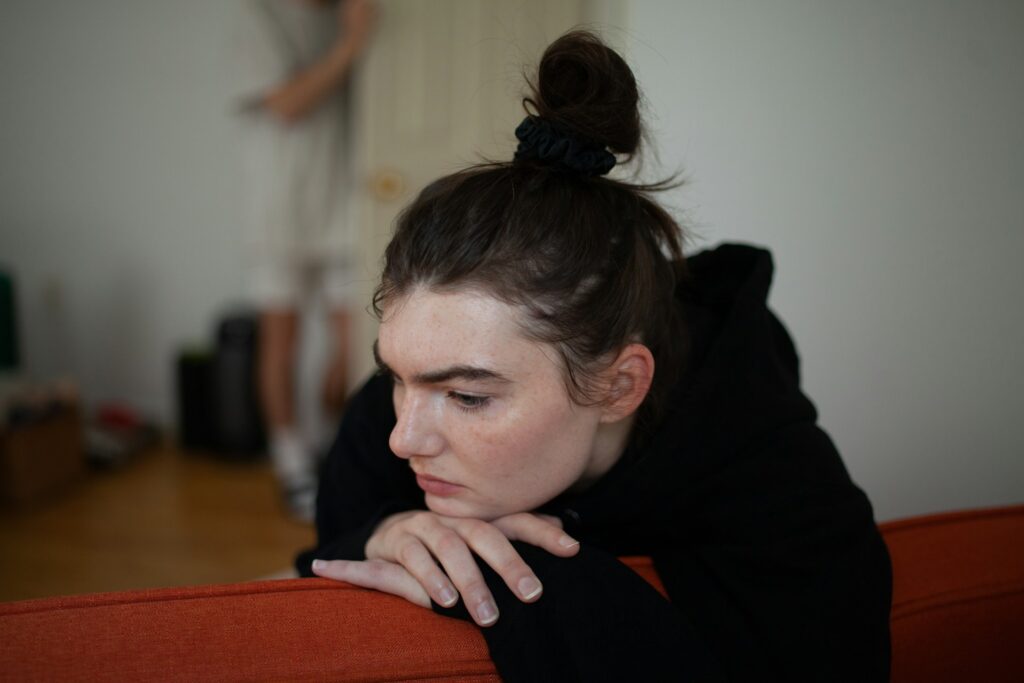
There’s something about the evenings that can make anxiety creep in louder than usual. The distractions fade, the pace slows down, and suddenly, your mind has all the time in the world to overthink. You replay conversations, worry about tomorrow, or feel that quiet, restless dread with no clear cause. If you’ve ever felt more anxious the second the day ends, you’re not alone, and you’re not stuck. Here are some realistic ways to ease evening anxiety without forcing yourself into a strict routine.
Give your brain a clear “off” switch.
Evening anxiety often builds when there’s no clear line between your day and your downtime. If you’ve been working, scrolling, or multitasking right up until bed, your brain hasn’t had a chance to land. Try setting a soft boundary, like dimming the lights, making a hot drink, or putting your phone on charge in another room. It doesn’t have to be a big production. Just something that says, “We’re done for the day now.”
Do something repetitive and low-stakes.
When your brain is overstimulated, gentle repetition can help slow it down. Think puzzles, sorting laundry, folding clothes, watering plants, or playing a calm game on your phone—things that don’t require emotional investment but keep your hands and mind moving. It’s a sneaky way to transition out of overthinking mode without trying to force yourself into stillness straight away. Movement helps. Predictability helps even more.
Swap the doomscrolling for something predictable.
Scrolling seems like a nice way to zone out, but it often fuels anxiety with bad news, comparison, and overstimulation. Plus, it rarely leaves you feeling calmer. Instead, try switching to something you’ve seen before. A familiar show. A comforting YouTube channel. A podcast with a slow, soothing voice. Predictability lowers mental tension in a way that fresh content often doesn’t.
Let yourself worry, but give it a deadline.
If your brain’s trying to spiral, sometimes resisting it just makes it louder. So try scheduling a short “worry window.” Set a timer for 10 minutes and let yourself think through whatever’s on your mind—out loud, on paper, or in your head. When the timer’s up, gently change focus. You’ve given your mind space to vent, but also a structure that keeps it from dragging into the night. It’s a weirdly effective compromise.
Focus on what feels safe, not productive.
Evening anxiety often comes with pressure to finish more, do more, figure something out. But trying to “fix” your feelings can backfire. Instead, ask what feels emotionally safe or soft in that moment. It might be watching videos of dogs. It might be lighting a candle and sitting in silence. It might be texting someone who makes you laugh. Safety first, always.
Keep lighting low and warm.
Bright overhead lights can mess with your nervous system and trick your body into thinking it’s time to be alert. Swap to lamps, candles, or fairy lights if you’ve got them—anything warm-toned and mellow. That simple change in lighting can help your body start winding down, even if your mind is still catching up.
Put thoughts into containers.
If you’ve got racing thoughts about work, decisions, or life in general, try writing them into categories: “can do something about it tomorrow,” “not mine to carry,” and “irrational but real.” It doesn’t magically solve anything, but it can make your mind feel a little more organised, like you’ve filed the mental chaos instead of letting it swirl around aimlessly.
Skip the pressure to meditate perfectly.
If sitting still and breathing just makes you feel more anxious, don’t force it. Meditation doesn’t have to be silent or still. It can be colouring in. It can be walking slowly around your room. It can be mindfully making a sandwich. The point is presence, not performance. You don’t have to do it “right”—you just need something that brings you into the moment, however casually.
Let your body lead when your mind won’t.
Even if your brain is going a hundred miles an hour, your body can still be an anchor. Try stretching your arms overhead. Rocking side to side. Rubbing your hands together or placing something warm on your chest. These little physical actions help remind your nervous system that you’re safe, even when your thoughts don’t quite believe it yet.
Don’t chase “calm”—aim for “slightly better.”
Trying to force calm can just make you feel worse when it doesn’t happen, so change the goal. You don’t need to fix the whole evening. Just look for what makes you feel 10% better. That might be lying down, drinking something warm, or changing rooms. Tiny changes matter more than big fixes when your brain is overwhelmed.


